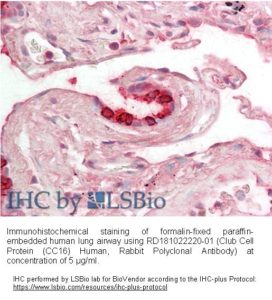Club Cell Protein (CC16) Human, Rabbit Polyclonal Antibody
Human Club Cell Protein (CC16, CC10 and also called uteroglobin, urinary protein 1 or Clara Cell Secretory Protein) belongs to the family of secretoglobins and is a secreted protein product of non-ciliated bronchiolar Club cells. Its function remains to be elucidated but there is convincing data suggesting its phospholipase A2 inhibitory activity as well as a number of other immunomodulatory features including inhibition of interferon gamma signaling and Th1 vs. Th2 lymphocyte regulation. It was proposed as a potential peripheral marker of respiratory epithelial injury and bronchial dysfunction. In serum, its increase is associated with age, asbestos, nitrogen chloride and ozone exposure, sarcoidosis and high PEEP ventilation. Decreased serum CC16 levels are found after pulmonary resection, in silica-exposed workers, smokers and in asthma. Decreased CC16 concentrations were also found in the amniotic fluid of fetuses suffering from pulmonary hypoplasia caused by various mechanisms (diaphragmatic hernia, diabetic fetopathy, Turner and Down syndrome).
Type
Polyclonal Antibody
Applications
Western blotting, ELISA, Immunohistochemistry
Antibodies Applications

Source of Antigen
Human urine
Hosts
Rabbit
Preparation
The antibody was raised in rabbits by immunization with the Human Club Cell Protein.
Species Reactivity
Human
Purification Method
Immunoaffinity chromatography on a column with immobilized recombinant Human Club Cell Protein (RD172022100, Biovendor).
Antibody Content
0.1 mg (determined by BCA method, BSA was used as a standard)
Formulation
The antibody is lyophilized in 0.05 M phosphate buffer, 0.1 M NaCl, pH 7.2. AZIDE FREE.
Reconstitution
Add 0.1 ml of deionized water and let the lyophilized pellet dissolve completely. Slight turbidity may occur after reconstitution, which does not affect activity of the antibody. In this case clarify the solution by centrifugation.
Shipping
At ambient temperature. Upon receipt, store the product at the temperature recommended below.
Storage/Expiration
The lyophilized antibody remains stable and fully active until the expiry date when stored at –20°C. Aliquot the product after reconstitution to avoid repeated freezing/thawing cycles and store frozen at –80°C. Reconstituted antibody can be stored at 4°C for a limited period of time; it does not show decline in activity after one week at 4°C.
Quality Control Test
Indirect ELISA – to determine titer of the antibody
SDS PAGE – to determine purity of the antibody
– Coppens JT, Van Winkle LS, Pinkerton K, Plopper CG. Distribution of Clara cell secretory protein expression in the tracheobronchial airways of rhesus monkeys. Am J Physiol Lung Cell Mol Phy. 2007 May;292 (5):L1155-62
– Greeley MA, Van Winkle LS, Edwards PC, Plopper CG. Airway trefoil factor expression during naphthalene injury and repair. Toxicol Sci. 2010 Feb;113 (2):453-67
– Huttmann EM, Greulich T, Hattesohl A, Schmid S, Noeske S, Herr C, John G, Jorres RA, Muller B, Vogelmeier C, Koczulla AR. Comparison of two devices and two breathing patterns for exhaled breath condensate sampling. PLoS One. 2011;6 (11):e27467
– Rau T, Dimmler A, Hafner M, Brabletz T, Kirchner T, Faller G. Aberrant expression of TTF-1 and forkhead factor HFH-4 in atrophic gastritis and ciliated metaplasia suggests gastric broncho-pulmonary transdetermination. J Pathol. 2005 Aug;206 (4):383-7

